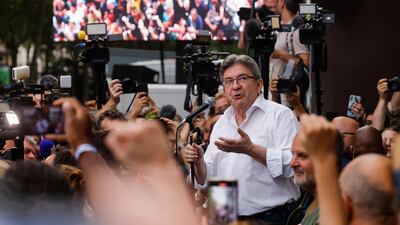The far-right National Rally party achieved a record result in France’s parliamentary elections on Sunday, increasing its number of National Assembly members by more than tenfold.
This success cemented the party's rise from fringe status to mainstream opposition and dealt a humbling blow to French President Emmanuel Macron, who saw his hopes of pushing through his domestic agenda stymied just two months after being re-elected for a second term.
Ms Le Pen's National Rally — Rassemblement National in French — took 89 seats in the 577-seat parliament, according to a final tally of ballots released by the Interior Ministry.
Major pollsters last week estimated 25-50 National Rally seats. The party had just two seats in 2012 and eight in the previous poll in 2017.
“We are facing a democratic shock because of a very strong breakthrough by the Rassemblement National,” Finance Minister Bruno Le Maire said.
Speaking on Monday at her stronghold in Henin-Beaumont, northern France, where she was re-elected for another five-year term in the assembly, Ms Le Pen said: “Macron is a minority president now … His retirement reform plan is buried.
“It’s a historic victory … a seismic event.”
Mr Macron had planned to increase the retirement age from 62 to 65.
Ms Le Pen told reporters: “We are entering the parliament as a very strong group and as such we will claim every post that belongs to us.
“The country is not ungovernable, but it's not going to be governed the way Emmanuel Macron wanted.”
As the biggest single party in the parliament — Mr Macron and left-wing politician Jean-Luc Melenchon both lead coalitions — she said National Rally will seek to chair the parliament’s powerful finance committee, one of the eight commissions that oversee the national budget.
Ms Le Pen’s party now has a sufficient number of legislators to constitute a formal group at the National Assembly and request seats in other committees, including a parliamentary investigation committee and those focusing on defence and foreign policy.
In addition, National Rally now has enough seats — more than 58 — to trigger a censure motion against the government that can lead to a no-confidence vote.
Centrist Mr Macron became the first president in decades to fail to garner an absolute majority in parliament, falling well short of the 289-seat threshold.
However, his Ensemble alliance will still remain the largest bloc, with 245 seats in the 577-seat National Assembly.
The poll also saw the left-wing Nupes alliance, clustered around Unsubmissive France party leader Mr Melenchon, perform strongly. It won 131 seats, making it the second-largest bloc in the assembly.
How Le Pen sparked rise in support
Securing 42 per cent of the vote in April's presidential election, National Rally's Ms Le Pen had already tapped into the general disenchantment with Mr Macron and anger across the country over the rising cost of living and the decline of many rural communities.
She hailed Sunday's historic result for her party, saying it would send “by far” its highest number of legislators to the next National Assembly.
National Rally's share of seats is fewer than either the parties supporting Mr Macron's Emsemble group or Nupes alliance.
But National Rally gains make it the second-largest individual party in parliament, giving it much more weight.
This should give it a formal legislative status for only the second time since the 1980s.
That would allow it to influence committees and get a designated amount of floor time to air its views.
It will, for example, be able to put forward no-confidence votes against the government, send draft legislation to France's top constitutional courts and lead parliamentary commissions.
More assembly members also means millions of euros of public funding for a party that has been struggling financially.
Since taking the helm in 2011, Ms Le Pen has sought to rid the party — known until 2018 as the National Front ― of the anti-Semitic image it acquired under the nearly 40-year leadership of her father, ex-paratrooper Jean-Marie Le Pen.
She has glossed over the movement’s toxic past and focused on issues affecting voters' finances, instead of immigration and race. She refused to join forces with pundit-turned-nationalist politician Eric Zemmour after the presidential vote.
Ms Le Pen, who lost to Mr Macron in April’s presidential ballot, immediately tried to position her party in opposition both to the president and to Mr Melenchon and the far left.
“We will be a firm opposition, without connivance, but responsible and respectful of institutions,” she said.
“We have achieved our three objectives: that of making Emmanuel Macron a minority president, without control of power and that of pursuing the political recomposition essential to democratic renewal.

“And of forming a decisive opposition group against the deconstructors from above, the Macronists, and from below, the Nupes.”
Sunday's result killed a so-called “republican front” of voters of all stripes that had rallied behind a mainstream candidate to prevent the far right progressing.
Ipsos pollster Mathieu Gallard attributed the National Rally surge to Nupes supporters not voting for Mr Macron in run-offs involving National Rally candidates.
But Mr Melenchon hailed the result that makes his Nupes bloc the largest opposition force.
“The rout of the presidential party is complete,” Mr Melenchon told supporters.
That view was not shared by all. “It’s not Nupes that’s won — and we can hear Mr Melenchon’s disappointment in his voice,” Mr Le Maire said on France 2 television, calling the election outcome also disappointing for Mr Macron’s supporters.
“It’s the National Rally that has very significantly improved its results this evening.”
How does Macron build a coalition?
Mr Macron will now begin work to try to find a majority by forming deals with other parties on the right, stirring up turmoil unprecedented in French politics in recent years.
He risks being distracted by domestic problems as he seeks to play a prominent role in putting an end to Russia's invasion of Ukraine and as a key statesman in the EU.
The French president also wants to deepen EU integration, raise the retirement age and inject new life into France's nuclear industry.
Jean Garrigues, a historian who writes about French politics, said the results could be a blessing in disguise for Mr Macron.
“It could force the president to negotiate, eroding the image of a self-centred ruling style that’s been sticking to him since 2017,” he said.

Mr Macron's options now include forming a ruling coalition or presiding over a minority government that has to enter into negotiations with opponents on a bill-by-bill basis. The alternative if no agreement can be found is for the eurozone's second biggest economy to be plunged into paralysis.
“We will be working from tomorrow towards forming a majority of action … to guarantee stability for our country and carry out the necessary reforms,” Prime Minister Elisabeth Borne said as results filtered through late on Sunday.
There could potentially be weeks of political deadlock as the president seeks to reach out to potential partners.
The most likely option would be an alliance with the Republicans, the traditional party of the French right, which has 61 MPs.














